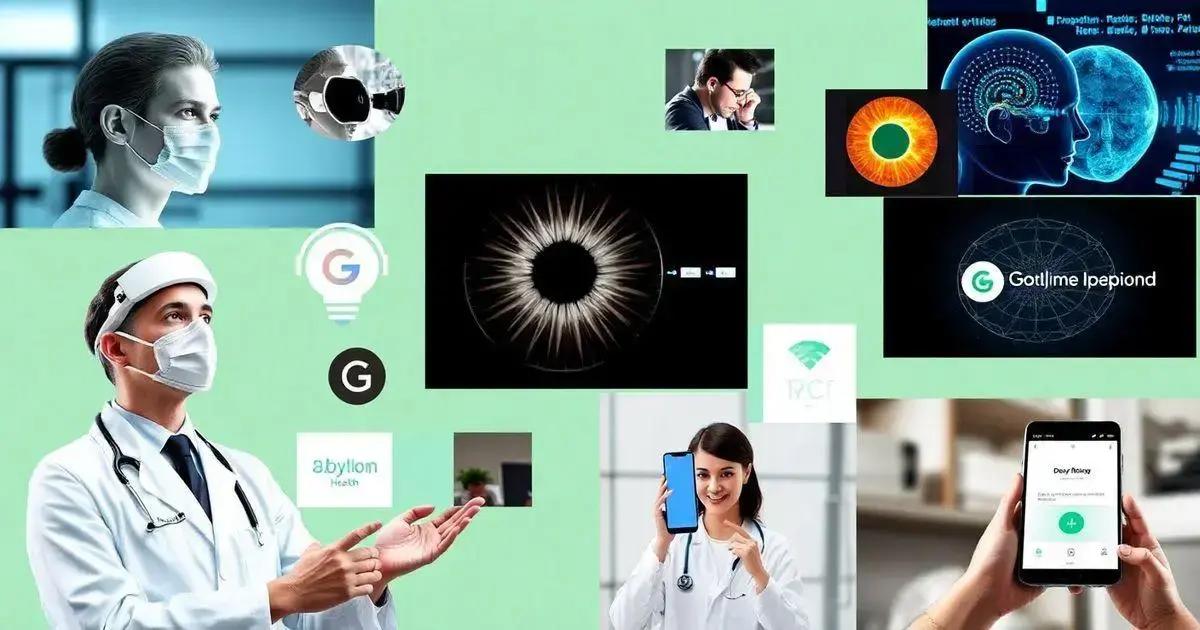The role of AI in healthcare is increasingly significant as it transforms the way healthcare professionals provide patient care. With the ability to analyse vast amounts of data and learn from it, AI is enhancing diagnostic accuracy and offering more personalised treatment options. This allows for faster and more precise medical decisions, improving patient outcomes.
Beyond diagnostics, AI is revolutionising patient monitoring and streamlining administrative processes. Technologies like IBM Watson Health and Google DeepMind showcase how AI can optimise workflows, reducing human error and increasing efficiency in hospitals and clinics. These innovations not only improve operational performance but also free up time for healthcare professionals to focus on patient care.
However, challenges such as data quality and ethical considerations must be addressed to ensure AI’s successful integration into healthcare. As technology continues to evolve, understanding its potential and limitations becomes crucial. Keep reading to explore how AI is shaping the future of medicine and what it means for patients and healthcare providers.
Understanding AI in Healthcare
Understanding AI in Healthcare involves grasping how technology is revolutionising medical practices. AI, or Artificial Intelligence, refers to computer systems designed to perform tasks that normally require human intelligence. These tasks include learning, reasoning, and problem-solving.
Key Components of AI in Healthcare
In healthcare, AI systems utilise massive amounts of data to improve patient outcomes. They can analyse medical records, assist in diagnosis, and even predict disease outbreaks. Furthermore, AI algorithms can help in detecting patterns that human eyes might miss, enhancing the overall quality of care.
Types of AI Technologies
Several AI technologies are reshaping healthcare, including:
- Machine Learning: A subset of AI that allows systems to learn and adapt from experience.
- Natural Language Processing (NLP): Enables machines to understand and interpret human language, facilitating communication.
- Robotics: Robotics enhances surgical precision and can automate various healthcare-related tasks.
How AI Enhances Efficiency
AI’s role in healthcare is not just about improving patient outcomes. It also significantly enhances the efficiency of healthcare systems. By automating routine tasks, AI frees up medical professionals to focus on more complex patient needs.
Real-Time Data Analysis
AI systems can process real-time data from numerous sources including Electronic Health Records (EHRs) and wearables, enabling timely decisions in patient care.
Patient Engagement
AI technologies, such as chatbots, play an essential role in engaging patients. They can answer queries, provide reminders for medication, and educate patients about treatment plans.
In summary, understanding AI in healthcare is fundamental for embracing its capabilities and potential benefits. The integration of AI into healthcare practices is paving the way for smarter, safer, and more efficient healthcare delivery.
Benefits of AI for Patient Care

Benefits of AI for Patient Care are numerous and impactful. AI technologies have the potential to significantly improve the quality of care that patients receive in various ways.
Enhanced Diagnostic Accuracy
AI systems can analyse medical images, scan records, and detect patterns that may go unnoticed by human eyes. This leads to better and earlier diagnosis, enabling timely treatment.
Personalised Treatment Plans
Using data from numerous sources, AI can help in creating personalised treatment plans tailored to individual patient needs. This ensures that patients receive care suited to their specific conditions.
Improved Patient Monitoring
With the help of wearable technology and AI, healthcare professionals can monitor patients’ vital signs in real-time. This allows for quick responses in emergencies and better management of chronic illnesses.
Reduced Administrative Burden
AI can automate routine administrative tasks like appointment scheduling and billing. This reduction in administrative workload allows healthcare staff to focus more on patient care rather than paperwork.
Efficient Resource Utilisation
AI can help hospitals manage resources efficiently. By predicting patient inflow and needs, AI can assist in optimal staffing decisions and inventory management, ensuring that facilities are prepared at all times.
Increased Accessibility to Care
AI technologies enable telemedicine, allowing more patients to access healthcare services easily. This is especially beneficial for those in remote areas who may have difficulty travelling to healthcare facilities.
In conclusion, the integration of AI in patient care not only supports healthcare providers but also enhances the overall patient experience, leading to better outcomes and satisfaction.
AI’s Impact on Medical Diagnosis
AI’s Impact on Medical Diagnosis is profound and continues to evolve. AI technologies are changing the way healthcare professionals approach diagnosis, making processes faster and more accurate.
Improved Diagnostic Accuracy
AI algorithms can analyse vast datasets, including medical images and patient records, to identify conditions that may be difficult for human professionals to detect. This leads to increased accuracy in diagnosing diseases.
Early Detection of Diseases
Through predictive analytics, AI can detect early signs of diseases such as cancer or diabetes from medical imaging. Early detection is crucial as it often leads to more effective treatment options.
Integration of Data Sources
AI can combine data from various sources, such as lab results, genetic information, and patient histories, to provide a comprehensive view of a patient’s health. This holistic approach allows for better-informed decisions in diagnosing conditions.
Reducing Human Error
AI reduces the likelihood of human error in diagnosis by providing second opinions and flagging anomalies that may be overlooked by healthcare providers. This adds an additional layer of reliability to medical assessments.
Real-Time Data Analysis
AI systems can analyse patient data in real-time, allowing for immediate decisions regarding diagnosis and treatment. This is particularly beneficial in emergency situations where time is critical.
Access to Advanced Diagnostic Tools
AI enables healthcare professionals to access advanced diagnostic tools that were previously not available or too costly. Examples include AI-powered radiology software that assists in interpreting X-rays and MRIs.
Overall, AI’s impact on medical diagnosis is transforming how healthcare providers approach patient assessments, leading to improved outcomes and better healthcare experiences for patients.
How AI Improves Treatment Plans

How AI Improves Treatment Plans is a vital area of focus in modern healthcare. With the help of AI technologies, healthcare providers can enhance and personalise treatment approaches for patients.
Data-Driven Insights
AI algorithms analyse vast amounts of medical data to uncover insights that can guide treatment plans. By considering factors like medical history, genetics, and lifestyle, AI helps in creating personalised care strategies that are more effective.
Predictive Analytics
AI uses predictive analytics to foresee potential health issues based on patient data. This ability allows doctors to adjust treatment plans proactively, preventing complications before they arise.
Personalisation of Therapies
With AI, treatment plans can be tailored specifically to an individual’s needs. For instance, AI can recommend adjustments in medication types and dosages based on how a patient responds to initial treatments.
Integration of Multi-Disciplinary Approaches
AI systems can integrate information from various specialties, offering a more comprehensive view of patient health. This helps medical teams collaborate better and creates treatment plans that consider all necessary aspects of patient care.
Enhanced Patient Engagement
AI tools enhance patient engagement by providing them with clear treatment plans and educational resources. This empowers patients to understand their health better and participate actively in their care.
Real-Time Monitoring and Adjustments
AI technologies enable continuous monitoring of patients, allowing healthcare providers to make real-time adjustments to treatment plans. This is particularly beneficial for patients with chronic conditions, ensuring immediate responses to changes in their health status.
In summary, AI significantly contributes to enhancing treatment plans by providing data-driven insights, personalisation, and real-time adjustments that lead to better patient outcomes.
Ethical Considerations of AI in Healthcare
Ethical Considerations of AI in Healthcare are paramount as technology continues to evolve. The integration of AI into healthcare raises various ethical questions and challenges that must be addressed.
Patient Privacy and Data Security
One of the primary concerns is patient privacy. AI systems require access to vast amounts of personal health data, which raises the risk of data breaches. Ensuring that patient information is secure and used ethically is crucial.
Informed Consent
Patients should be fully informed about how their data will be used. Informed consent is a critical ethical requirement, and healthcare providers must ensure that patients understand the implications of AI technologies in their treatment.
Bias and Fairness
AI algorithms can unintentionally perpetuate biases if they are trained on unrepresentative datasets. This can lead to unfair treatment decisions that disproportionately affect certain groups. Developers must actively work to minimise bias in AI systems.
Accountability and Liability
Determining accountability in AI-driven healthcare decisions can be complex. If an error occurs, it is vital to understand who is responsible—the AI developers, healthcare providers, or the systems themselves.
Transparency in AI Decision-Making
Healthcare providers and patients should understand how AI systems make decisions. Transparency in AI algorithms helps build trust and allows for scrutiny in the treatment process.
Job Displacement Concerns
The introduction of AI in healthcare may lead to concerns about job displacement for healthcare workers. While AI can enhance efficiency, it’s essential to consider how to integrate these technologies in a way that complements human roles rather than replaces them.
Addressing these ethical considerations is critical for the responsible integration of AI in healthcare. Ensuring that technology serves to improve patient care while upholding ethical standards is essential for future advancements.
The Future of AI in Health Services

The Future of AI in Health Services holds exciting possibilities as technology evolves. AI is set to play a crucial role in transforming how healthcare is delivered.
Widespread Adoption of Telemedicine
AI will enhance telemedicine by providing smarter diagnostic tools and more efficient patient monitoring systems. This makes healthcare more accessible, especially in remote areas, allowing patients to receive care without needing to travel.
Integration of AI in Clinical Workflows
Healthcare providers are increasingly integrating AI into their clinical workflows. With advanced algorithms assisting in data analysis, healthcare professionals can make informed decisions quickly, improving patient outcomes.
Personalised Medicine
The future of AI will focus on personalised medicine. AI can analyse genetic information alongside medical histories to customise treatment plans, leading to better results for patients.
Predictive Analytics for Better Outcomes
Using AI’s predictive capabilities, healthcare systems can anticipate issues such as patient deterioration and disease outbreaks. This proactive approach enables timely interventions and better resource allocation.
Enhanced Patient Engagement
AI-powered applications will facilitate improved patient engagement by providing reminders, educational content, and feedback on treatment adherence. Engaged patients are more likely to take an active role in their health.
Robotics and Automation
In the future, AI-driven robotics will become commonplace in surgeries and routine tasks. This will not only improve efficiency but also reduce the risk of human error during procedures.
Overall, the future of AI in health services promises a shift towards more efficient, effective, and personalised care. Embracing these advancements will be critical for the healthcare industry.
Challenges in Implementing AI Solutions
Challenges in Implementing AI Solutions in healthcare are significant and multifaceted. While AI has the potential to enhance patient care, various obstacles must be addressed to ensure successful integration.
Data Quality and Availability
One of the primary challenges is the quality and availability of data. AI systems require large volumes of high-quality, structured data to function effectively. In many cases, healthcare data is fragmented or inconsistent, making it difficult for AI to deliver accurate results.
Cost of Implementation
The cost of implementing AI technologies can be substantial. From acquiring new technology to training staff, the financial commitment can be a barrier for many healthcare providers, particularly smaller facilities.
Staff Training and Education
Healthcare professionals must be properly trained to utilise AI tools effectively. This requires ongoing education and training programs, which can be time-consuming and costly.
Integration with Existing Systems
A significant challenge is integrating AI solutions with existing healthcare systems. Many facilities rely on outdated technology, and upgrading these systems to work with AI can be complex.
Ethical and Regulatory Concerns
AI in healthcare raises ethical issues, including patient privacy and consent. Furthermore, navigating the regulatory landscape can be complicated, as laws and guidelines related to AI technology are still evolving.
Resistance to Change
Healthcare professionals may be resistant to adopting AI solutions, either due to a lack of understanding of the technology or fear of losing their jobs. Addressing these concerns and demonstrating the benefits of AI is crucial for gaining buy-in from staff.
These challenges require a thoughtful approach to overcome. By addressing these obstacles, healthcare providers can pave the way for successful AI integration, ultimately improving patient care and operational efficiency.
Real-World Examples of AI in Healthcare

Real-World Examples of AI in Healthcare showcase the potential of technology to enhance patient outcomes and streamline operations.
IBM Watson Health
IBM Watson Health uses AI to assist doctors in diagnosing diseases and recommending treatments. Its technology analyses huge amounts of medical literature and patient data to support healthcare professionals in making informed decisions.
Google DeepMind
Google’s DeepMind has developed AI systems that can quickly diagnose eye diseases from retinal scans. This technology has demonstrated remarkable accuracy, reducing the time required to assess a patient’s condition.
PathAI
PathAI focuses on pathology, using AI to assist in diagnosing diseases from medical images. Their technology aims to reduce diagnostic errors, improve accuracy, and ensure that patients receive the correct treatment promptly.
Olive Health
Olive Health is an AI-powered platform that automates various administrative tasks within healthcare organisations. By handling processes like prior authorisations and claims management, Olive allows healthcare professionals to concentrate more on patient care.
Babylon Health
Babylon Health offers a telemedicine app that uses AI to provide health assessments and advice. Patients can input their symptoms, and the AI provides possible conditions and advice on seeking additional care.
Tempus
Tempus leverages AI with a focus on genomics and patient data to help doctors make targeted treatment decisions in cancer care. Their platform collects and analyses clinical and molecular data to tailor treatment plans to individuals.
These real-world examples highlight how AI is already transforming healthcare, making significant strides in diagnostics, treatment, and administrative efficiencies.
Embracing the Future of AI in Healthcare
The integration of Artificial Intelligence (AI) in healthcare presents a wealth of opportunities to enhance patient care and transform medical practices.
From improving diagnostic accuracy to personalising treatment plans, AI’s capabilities are revolutionising the way healthcare is delivered. Real-world examples illustrate how AI technologies are already making significant impacts in various healthcare settings.
However, the path to successful AI implementation is not without challenges. Issues such as data quality, ethical considerations, and staff training must be addressed to harness the full potential of AI.
As we move forward, embracing AI in healthcare will require collaboration among technology developers, healthcare providers, and regulatory bodies. By doing so, we can ensure that AI contributes positively to patient outcomes and enhances the overall health service delivery.
Check out our article on AI in Business to explore how artificial intelligence is transforming industries and driving innovation.
